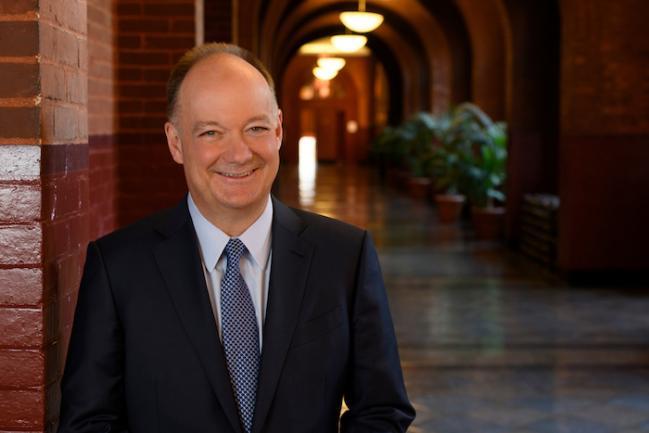In the wake of an antitrust lawsuit, questions about progress on GU272, and the COVID-19 pandemic, Georgetown University President John J. DeGioia (CAS ’79, GRD ’95) sat down with The Hoya on Jan. 13 to discuss his thoughts on the current state of the university.
This is the first time The Hoya has been granted a conversation with DeGioia since August 2019.

Financial Aid Lawsuit
On Jan. 9, five individuals filed a class action lawsuit against 16 top universities — including Georgetown — alleging antitrust violations, price fixing and illegal collusion between the schools that may have resulted in admission disadvantages for students who require financial aid. The suit alleges that at least nine of the schools — including Georgetown — are not abiding by need-blind policies by favoring wealthy applicants.
Georgetown’s financial aid program has been need-blind since its launch in 1978, according to DeGioia.
“When we launched the program in 1978, it cost us $2 million that year to meet the full need of our student body, and this year $135 million was put into this program,” DeGioia said. “It’s enabling us to ensure that roughly the 40% of our student body that requires need-based aid receive it. Forty percent are receiving $135 million of financial aid.”
When asked what he would do to rebuild trust with students who receive financial aid in light of the suit, DeGioia responded that he hoped students would presume trust in the institution.
“I just hope that what they have experienced here will be a reservoir that will enable them to presume trust,” DeGioia said.
GU272
In December 2021, descendants of the GU272 — the collective name for the 314 enslaved people sold by the Maryland Province of the Society of Jesus in 1838 to financially sustain the university — hosted an event with members of Georgetown University Students Association titled “Georgetown F*cking Lied,” demanding that the university pay reparations to descendants.
In 2019, the student body voted to pass the GU272 referendum,which called for the addition of a $27.20 semesterly fee to student bills for allocation to descendants of the GU272. Instead of reparations, the university announced a $400,000 reconciliation fund in 2019, designed to support projects that benefit the descendant community.
In December 2021, the university told The Hoya that funds had been set aside for a spring 2022 launch of the reconciliation fund. DeGioia reaffirmed to The Hoya that funding would be distributed sometime this spring.
“And hopefully, you won’t have to ask me a question like this ever again,” DeGioia said. “Because I think we should be launched this spring.”
These funds will support projects focused on memory and reconciliation designed by a working group the university is currently forming. The $400,000 fund will become an annual investment towards projects that focus on memory and reconciliation, according to DeGioia.
“The effort will be to ensure that we can actually distribute funds during this coming spring. We are also putting in place the new annual fund initiative that will ensure we can restore that money every year,” DeGioia said. “Every year we will be investing $400,000 in projects that will be identified by this kind of oversight group or working group. We’re in the process of putting that group together.”
According to DeGioia, the university was waiting to implement the fund until the Descendants Truth & Reconciliation Foundation, a separate entity from the university that works to support racial healing and fund educational opportunities for descendants, launched in March 2021.
Waiting for the foundation — as well as the onset of the COVID-19 pandemic — caused the university to delay the launch of the $400,000 fund, DeGioia said.
“We didn’t feel it was appropriate to get ahead of the foundation. With our work, we didn’t want to create confusion in the larger communities,” he said. “I regret that it took us longer than I would have hoped because we made the commitment to do all this in November of 2019.”
COVID-19 Protocols
With the rise of the omicron variant, Georgetown plans to hold classes virtually through Jan. 30. Students, meanwhile, can move into on-campus residence halls, and public spaces like Lauinger Library are still open with limited capacity. No university buildings permit indoor dining, including Leo J. O’Donovan Dining Hall, which is now grab-and-go.
The university reported 342 positive COVID-19 cases among community members Jan. 9-15. These numbers resulted in a weekly positivity rate of 6.49%, a 5.83 percentage point decrease from the week of Jan. 2.
Despite these restrictions, DeGioia said he was optimistic about returning to in-person classes by the end of January.
“We are still operating in a pandemic, and perhaps the most complex moment in the pandemic. I think we’re going to need to manage our commitments with even more care, and attention,” DeGioia said. “We want to bring everybody back into the classroom on January 31.”





















Illuminated Alum • Jan 23, 2022 at 9:49 pm
DeGioia is a total clown. Fire him
Lou S. • Jan 23, 2022 at 4:33 pm
Given this article, it seems like the interview lasted 3 minutes.